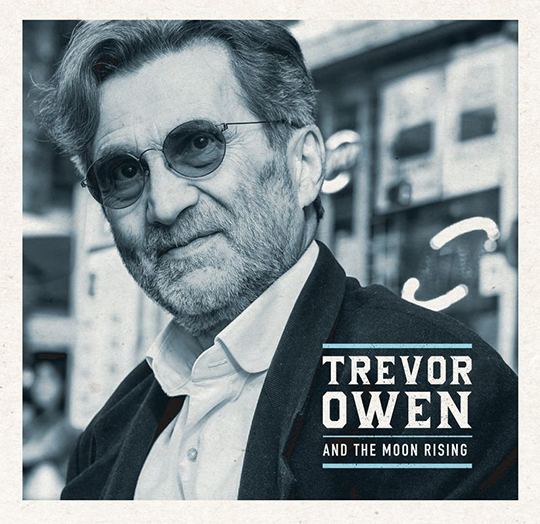
The veteran Toronto-based musician Trevor Owen has just released his latest single, “Horizontal” — available now!
Though the groovy two minute-spanning number was released as Owen’s latest single, it’s actually a cover of the 1940s tune by the famed American lyricist Hal David. “Horizontal” was the first success David actually enjoyed in his lengthy career, though it was soon banned in Boston for being too risqué… “Where lying down was apparently considered controversial,” according to Owen. The song was co-written by David and Lou Ricca.
Along with “Horizontal,” Owen’s accompanying debut album And the Moon Rising features three other covers and six original tracks. It was released last January and produced by Marcus Vichert. Owen began recording the album in 2018 with engineer Braden Sauder at Marquee Sound in Toronto, and the record was mastered by Stephen Stepanic at João Carvalho Mastering.
As a young schoolboy, Owen made the decision to drop out of school back in the 1960s in order to pursue a career in music. He started playing in Yorkville clubs and pubs before landing gigs all across Canada. He played cover sets, his own original music, with bands and many other acts, until finally recording and releasing And the Moon Rising in 2020. His long-lasting career ended up paying for a post-secondary education, which resulted in him becoming a teacher in Toronto.
- What made you want to pursue a life in music?
That word “want” is interesting to me. It is not that I didn’t want to do it, although there were times when I wondered about it, certainly. Indeed, I learned that finding a way out of music could be as complex a task as finding a way in. I had dropped out of school at 15, and playing in a band was a happier time, by far. Things went well for several years with enough gigs, mostly in southern Ontario, to keep us going. However, when I was 20, the band broke up, and I found myself in what seemed like insurmountable debt, with no income, and few prospects. At that time, I did not know whether a life in music would be possible for me but, after I found a way to return to school, I discovered that I could earn enough of a living as a gigging guitarist to make my way.
Some of the bands I found work in were quite good, others not so much, but I was grateful for all of them and, taken together, they paid my way through school. More than fair, it seemed to me.
So, had your question been “What made you grateful to pursue a life in music,” well, “All of it” might have been a readier answer, even with bands that struggled (so long as they paid, of course!)
- Can you tell us what you’re working on right now that most excites you?
I have been working on a few things: first, I recorded and released my first album last year, “And the Moon Rising,” which is, and has been, quite an exciting prospect; second, I have been working with a publicist, Eric Alper, which I feel pretty excited about; and finally, like everyone, I have been quite busy dealing with the influence of doing these things in a pandemic!
“And the Moon Rising” was intended to be—and is, I hasten to add—a digital release, but I also did a small run of CDs, which I intended to use as promotional material. At that time, my primary interest was to nurture gigging opportunities in support of the album which, as we all know now, disappeared with COVID-19.
Indeed, had you asked what and not who, “COVID-19” could also have been my answer to your next question about influences; however, I know that isn’t what you meant to ask, so I will move on.
- Who are your biggest influences?
It was at the Riverboat coffee house in Toronto’s Yorkville village where Colleen Peterson kindly gave me permission to perform her great song, “Not the Only One,” which appears on my album along with my cover of her cover of “Richland Woman Blues,” by Mississippi John Hurt. I was taken by her generosity, which I was lucky to have known before her death from cancer, too young at 45. I recall that Colleen was not confident about her guitar playing; one’s imagination is always ahead of one’s abilities. But I also recall that it was important to her, and to any of us who saw her perform live, that she try. My own view is that she was better than she gave herself credit for; whatever she felt she may have lacked in her abilities on guitar, she made up for in her great feel.
I’ve been listening to Mary Chapin Carpenter quite a lot lately—the fine guitar work of Duke Levine on “The Dirt and the Stars” album regularly summons me to hit “repeat”—as well as Bonnie Raitt, Sarah Harmer, Amy Millan, Shawn Colvin, Lyle Lovatt, Dixie Chicks, Shirley Eikhard, among others…all great.
- What was your favourite live concert and why?
Money was always tight as I was growing up, which made the thought of being a concert- or festival-goer a rarity, on the one hand, and memorable, on the other. My first live concert was the Toronto Pop Festival in 1969. Procol Harum, Sly & the Family Stone, Blood, Sweat & Tears, The Band, and many others…a great experience, no question, even now.
- What would you like to say to your old / new fans?
Well, first of all, “thank you” for your support and interest. I think of you whenever I see a spike in the number of “listens” I get on the various services. I really appreciate these, and I am happy to think that you enjoy the music!